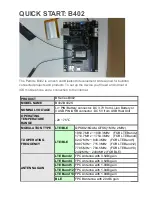C P 2 4 0 0 / 1 - D K
10
Rev. 0.1
5. Using the Keil Software 8051 Tools with the Silicon Laboratories IDE
To perform source-level debugging with the IDE, configure the Keil 8051 tools to generate an absolute object file in
the OMF-51 format with object extensions and debug records enabled. Build the OMF-51 absolute object file by
calling the Keil 8051 tools at the command line (e.g., batch file or make file) or by using the project manager built
into the IDE. The default configuration when using the Silicon Laboratories IDE project manager enables object
extension and debug record generation. Refer to "AN104: Integrating Keil 8051 Tools into the Silicon Labs IDE" in
the “
Silabs\MCU\Documentation\ApplicationNotes
” directory on the CD-ROM for additional information on using the
Keil 8051 tools with the Silicon Laboratories IDE.
To build an absolute object file using the Silicon Laboratories IDE project manager, you must first create a project.
A project consists of a set of files, IDE configuration, debug views, and a target build configuration (list of files and
tool configurations used as input to the assembler, compiler, and linker when building an output object file).
The following sections illustrate the steps necessary to manually create a project with one or more source files,
build a program, and download it to the target in preparation for debugging. (The IDE will automatically create a
single-file project using the currently open and active source file if you select Build/Make Project before a project is
defined.)
5.1. Creating a New Project
1. Select Project
New Project to open a new project and reset all configuration settings to default.
2. Select File
New File to open an editor window. Create your source file(s) and save the file(s) with a
recognized extension, such as .c, .h, or .asm, to enable color syntax highlighting.
3. Right-click on “New Project” in the Project Window. Select Add files to project. Select files in the file browser
and click Open. Continue adding files until all project files have been added.
4. For each of the files in the Project Window that you want assembled, compiled and linked into the target build,
right-click on the file name and select Add file to build. Each file will be assembled or compiled as appropriate
(based on file extension) and linked into the build of the absolute object file.
5. If a project contains a large number of files, the “Group” feature of the IDE can be used to organize. Right-click
on “New Project” in the Project Window. Select Add Groups to project. Add pre-defined groups or add
customized groups. Right-click on the group name and choose Add file to group. Select files to be added.
Continue adding files until all project files have been added.
5.2. Building and Downloading the Program for Debugging
1. Once all source files have been added to the target build, build the project by clicking on the Build/Make Project
button in the toolbar or selecting Project
Build/Make Project from the menu.
Note:
After the project has been built the first time, the Build/Make Project command will only build the files that
have been changed since the previous build. To rebuild all files and project dependencies, click on the Rebuild
All button in the toolbar or select Project
Rebuild All from the menu.
2. Before connecting to the target device, several connection options may need to be set. Open the Connection
Options window by selecting Options
Connection Options... in the IDE menu. First, select the appropriate
adapter in the “Serial Adapter” section. Next, the correct “Debug Interface” must be selected. C8051F93x-
C8051F92x family devices use the Silicon Labs 2-wire (C2) debug interface. Once all the selections are made,
click the OK button to close the window.
3. Click the Connect button in the toolbar or select Debug
Connect from the menu to connect to the device.
4. Download the project to the target by clicking the Download Code button in the toolbar.
Note:
To enable automatic downloading if the program build is successful select Enable automatic connect/
download after build in the Project
Target Build Configuration dialog. If errors occur during the build process,
the IDE will not attempt the download.
5. Save the project when finished with the debug session to preserve the current target build configuration, editor
settings and the location of all open debug views. To save the project, select Project
Save Project As... from
the menu. Create a new name for the project and click on Save.
electronic components distributor


















